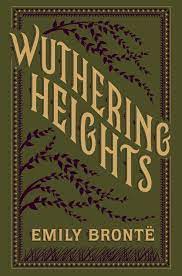Wuthering Heights Page #15
Wuthering Heights is an 1847 novel by Emily Brontë, initially published under the pseudonym Ellis Bell. It concerns two families of the landed gentry living on the West Yorkshire moors, the Earnshaws and the Lintons, and their turbulent relationships with Earnshaw's adopted son, Heathcliff.
She gazed concernedly at the dusky fingers she held in her own, and also at her dress; which she feared had gained no embellishment from its contact with his. “You needn’t have touched me!” he answered, following her eye and snatching away his hand. “I shall be as dirty as I please: and I like to be dirty, and I will be dirty.” With that he dashed headforemost out of the room, amid the merriment of the master and mistress, and to the serious disturbance of Catherine; who could not comprehend how her remarks should have produced such an exhibition of bad temper. After playing lady’s-maid to the new-comer, and putting my cakes in the oven, and making the house and kitchen cheerful with great fires, befitting Christmas-eve, I prepared to sit down and amuse myself by singing carols, all alone; regardless of Joseph’s affirmations that he considered the merry tunes I chose as next door to songs. He had retired to private prayer in his chamber, and Mr. and Mrs. Earnshaw were engaging Missy’s attention by sundry gay trifles bought for her to present to the little Lintons, as an acknowledgment of their kindness. They had invited them to spend the morrow at Wuthering Heights, and the invitation had been accepted, on one condition: Mrs. Linton begged that her darlings might be kept carefully apart from that “naughty swearing boy.” Under these circumstances I remained solitary. I smelt the rich scent of the heating spices; and admired the shining kitchen utensils, the polished clock, decked in holly, the silver mugs ranged on a tray ready to be filled with mulled ale for supper; and above all, the speckless purity of my particular care—the scoured and well-swept floor. I gave due inward applause to every object, and then I remembered how old Earnshaw used to come in when all was tidied, and call me a cant lass, and slip a shilling into my hand as a Christmas-box; and from that I went on to think of his fondness for Heathcliff, and his dread lest he should suffer neglect after death had removed him: and that naturally led me to consider the poor lad’s situation now, and from singing I changed my mind to crying. It struck me soon, however, there would be more sense in endeavouring to repair some of his wrongs than shedding tears over them: I got up and walked into the court to seek him. He was not far; I found him smoothing the glossy coat of the new pony in the stable, and feeding the other beasts, according to custom. “Make haste, Heathcliff!” I said, “the kitchen is so comfortable; and Joseph is upstairs: make haste, and let me dress you smart before Miss Cathy comes out, and then you can sit together, with the whole hearth to yourselves, and have a long chatter till bedtime.” He proceeded with his task, and never turned his head towards me. “Come—are you coming?” I continued. “There’s a little cake for each of you, nearly enough; and you’ll need half-an-hour’s donning.” I waited five minutes, but getting no answer left him. Catherine supped with her brother and sister-in-law: Joseph and I joined at an unsociable meal, seasoned with reproofs on one side and sauciness on the other. His cake and cheese remained on the table all night for the fairies. He managed to continue work till nine o’clock, and then marched dumb and dour to his chamber. Cathy sat up late, having a world of things to order for the reception of her new friends: she came into the kitchen once to speak to her old one; but he was gone, and she only stayed to ask what was the matter with him, and then went back. In the morning he rose early; and, as it was a holiday, carried his ill-humour on to the moors; not re-appearing till the family were departed for church. Fasting and reflection seemed to have brought him to a better spirit. He hung about me for a while, and having screwed up his courage, exclaimed abruptly—“Nelly, make me decent, I’m going to be good.” “High time, Heathcliff,” I said; “you have grieved Catherine: she’s sorry she ever came home, I daresay! It looks as if you envied her, because she is more thought of than you.” The notion of envying Catherine was incomprehensible to him, but the notion of grieving her he understood clearly enough. “Did she say she was grieved?” he inquired, looking very serious. “She cried when I told her you were off again this morning.” “Well, I cried last night,” he returned, “and I had more reason to cry than she.” “Yes: you had the reason of going to bed with a proud heart and an empty stomach,” said I. “Proud people breed sad sorrows for themselves. But, if you be ashamed of your touchiness, you must ask pardon, mind, when she comes in. You must go up and offer to kiss her, and say—you know best what to say; only do it heartily, and not as if you thought her converted into a stranger by her grand dress. And now, though I have dinner to get ready, I’ll steal time to arrange you so that Edgar Linton shall look quite a doll beside you: and that he does. You are younger, and yet, I’ll be bound, you are taller and twice as broad across the shoulders; you could knock him down in a twinkling; don’t you feel that you could?” Heathcliff’s face brightened a moment; then it was overcast afresh, and he sighed. “But, Nelly, if I knocked him down twenty times, that wouldn’t make him less handsome or me more so. I wish I had light hair and a fair skin, and was dressed and behaved as well, and had a chance of being as rich as he will be!” “And cried for mamma at every turn,” I added, “and trembled if a country lad heaved his fist against you, and sat at home all day for a shower of rain. Oh, Heathcliff, you are showing a poor spirit! Come to the glass, and I’ll let you see what you should wish. Do you mark those two lines between your eyes; and those thick brows, that, instead of rising arched, sink in the middle; and that couple of black fiends, so deeply buried, who never open their windows boldly, but lurk glinting under them, like devil’s spies? Wish and learn to smooth away the surly wrinkles, to raise your lids frankly, and change the fiends to confident, innocent angels, suspecting and doubting nothing, and always seeing friends where they are not sure of foes. Don’t get the expression of a vicious cur that appears to know the kicks it gets are its dessert, and yet hates all the world, as well as the kicker, for what it suffers.” “In other words, I must wish for Edgar Linton’s great blue eyes and even forehead,” he replied. “I do—and that won’t help me to them.” “A good heart will help you to a bonny face, my lad,” I continued, “if you were a regular black; and a bad one will turn the bonniest into something worse than ugly. And now that we’ve done washing, and combing, and sulking—tell me whether you don’t think yourself rather handsome? I’ll tell you, I do. You’re fit for a prince in disguise. Who knows but your father was Emperor of China, and your mother an Indian queen, each of them able to buy up, with one week’s income, Wuthering Heights and Thrushcross Grange together? And you were kidnapped by wicked sailors and brought to England. Were I in your place, I would frame high notions of my birth; and the thoughts of what I was should give me courage and dignity to support the oppressions of a little farmer!”
Translation
Translate and read this book in other languages:
Select another language:
- - Select -
- 简体中文 (Chinese - Simplified)
- 繁體中文 (Chinese - Traditional)
- Español (Spanish)
- Esperanto (Esperanto)
- 日本語 (Japanese)
- Português (Portuguese)
- Deutsch (German)
- العربية (Arabic)
- Français (French)
- Русский (Russian)
- ಕನ್ನಡ (Kannada)
- 한국어 (Korean)
- עברית (Hebrew)
- Gaeilge (Irish)
- Українська (Ukrainian)
- اردو (Urdu)
- Magyar (Hungarian)
- मानक हिन्दी (Hindi)
- Indonesia (Indonesian)
- Italiano (Italian)
- தமிழ் (Tamil)
- Türkçe (Turkish)
- తెలుగు (Telugu)
- ภาษาไทย (Thai)
- Tiếng Việt (Vietnamese)
- Čeština (Czech)
- Polski (Polish)
- Bahasa Indonesia (Indonesian)
- Românește (Romanian)
- Nederlands (Dutch)
- Ελληνικά (Greek)
- Latinum (Latin)
- Svenska (Swedish)
- Dansk (Danish)
- Suomi (Finnish)
- فارسی (Persian)
- ייִדיש (Yiddish)
- հայերեն (Armenian)
- Norsk (Norwegian)
- English (English)
Citation
Use the citation below to add this book to your bibliography:
Style:MLAChicagoAPA
"Wuthering Heights Books." Literature.com. STANDS4 LLC, 2025. Web. 16 Jan. 2025. <https://www.literature.com/book/wuthering_heights_1627>.




Discuss this Wuthering Heights book with the community:
Report Comment
We're doing our best to make sure our content is useful, accurate and safe.
If by any chance you spot an inappropriate comment while navigating through our website please use this form to let us know, and we'll take care of it shortly.
Attachment
You need to be logged in to favorite.
Log In